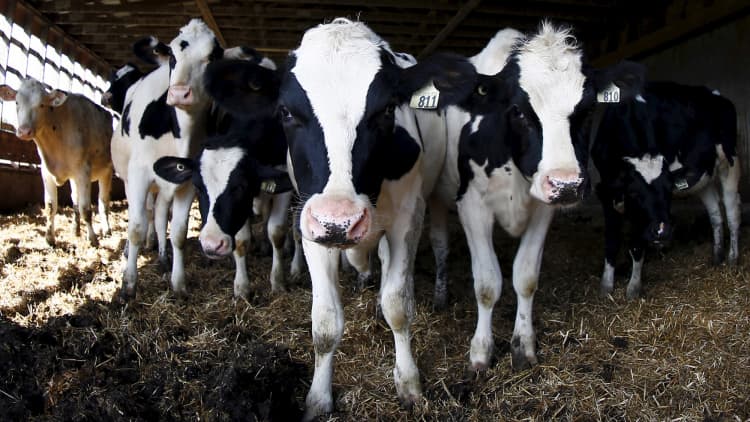
On one medium-sized farm in western Kansas, fourth-generation farmer Derek Sawyer is doing all he can to stay afloat. He has 2,500 acres of land and about 700 cows, but looming on the horizon is a White House budget proposal that would cut $38 billion in subsidies to farmers like him.
President Trump's budget would slash several programs at the U.S. Department of Agriculture — including crop insurance — that farmers say have been a lifeline in recent years. About $28 billion is on the chopping block from crop insurance alone.
Sawyer's Land & Cattle grows wheat, corn and soybeans. Sawyer took out his first crop insurance after his grandfather passed away and said he wouldn't be farming right now if it weren't for the protection.
"It's definitely not a program that helps you get rich," Sawyer said. "But crop insurance will come close to helping us cover the expenses of the crop."
The program helps farmers afford the cost of buying insurance for their crops. According to Montana State University economics professor Vincent Smith, crop insurance premiums total about $9.5 billion annually. The federal government currently covers about 60 percent of the cost, or $6 billion. Farmers contribute the rest.
It has been really rough the past couple of years. We're looking at corn and wheat prices that are roughly half of what we were seeing five or six years ago.Derek SawyerKansas farmer
The president's budget calls for capping crop insurance subsidies at $40,000 per farmer, saving $16.2 billion over a decade. The administration argues that farmers don't need an incentive to participate in crop insurance, because it's already an integral part of their business models.
Separately, the White House proposal would cut nearly $12 billion from a safety net known as the harvest price option that provides a buffer to farmers facing a harvest shortfall.
"The goal of this proposal is to optimize the current crop insurance program so that it will continue to provide a quality safety net at a lower cost," the administration said in its budget.
But the American Farm Bureau, an industry lobbying group, said the proposal would "gut" the crop insurance program. The group's chief economist, Bob Young, said kicking people out of the pool could make insurance more expensive. Young said family farms would likely be affected. He said farms bigger than 1,400 acres — like Sawyer's — account for about two-thirds of corn production.
The White House budget also calls for eliminating subsidies to farmers with revenue of more than $500,000 a year. The current limit is $900,000, Smith said. If enacted, the proposal would save $653 million over 10 years. Young said farm revenue is down about 50 percent from 2014 because of lower commodity prices.
"To come in and get this kind of a whack, the sector would really feel it," he said.
At Sawyer's farm, annual revenue for the past several years has been about $3 million, but Sawyer said his profit margin is razor-thin. It took a record wheat crop last year just to break even, he said.
"It has been really rough the past couple of years. We're looking at corn and wheat prices that are roughly half of what we were seeing five or six years ago," he said. "We're looking at the cost of production on nearly all the crops exceeding the value of the crop at harvest."
Farmers pin hopes on Congress
To be sure, the White House budget is generally considered a wish list. The farmers are hoping relief will come when Congress writes its own version of the budget. In addition, lawmakers must renegotiate the 2014 Farm Bill, which is set to expire in September 2018. That bill was particularly bruising to farmers, slicing $23 billion from the Department of Agriculture over 10 years. The Farm Bureau called Trump's proposed cuts a magnitude higher.
Although Congress is in recess this week, the House and Senate Agriculture committees have begun hearings on the Farm Bill reauthorization. When Congress returns next week, budget negotiations will begin in earnest.
"We will fight to ensure farmers have a strong safety net so this key segment of our economy can weather current hard times and continue to provide all Americans with safe, affordable food," committee chairmen Rep. Mike Conaway, R.-Texas, and Sen. Pat Roberts, R.-Kan., said in a statement.

The crop insurance program is run by the USDA's risk management agency. It was established in 1937 during President Franklin D. Roosevelt's second term, but subsidy payments jumped during the 1980s, according to Smith. There are about 2.1 million farms in the country, according to the Farm Bureau. Between 250,000 and 300,000 of them produce 80 percent of the nation's food. Most of the grain farms are family-managed operations, Young said, with family members providing most of the management and labor.
Smith said about 85 to 90 percent of all crops are covered under the federal crop insurance program. Additionally, more than 90 percent of farms have substantial off-farm income, and many farmers use their land to offset their tax liability on other income.
Sawyer said his community is already struggling. The neighborhood cafe is closed for hours during the day and shuts down a few days a week because of a lack of farmers coming in for lunch. His equipment dealer moved into a different industry because he could see that farm income was going to be tough and machinery sales were going down.
Still, Sawyer said he is determined to stay on the land in McPherson County that his family has farmed for four generations. His 4-year-old son, Evan, was helping with harvesting grain and feeding cattle before he could even walk. Sawyer said he remains upbeat about his industry.
"If I'm not optimistic, I'm in the wrong business," he said.


